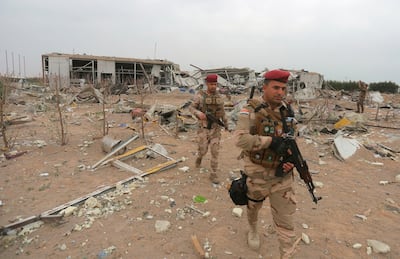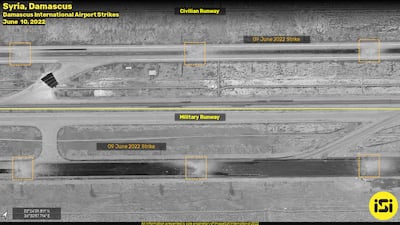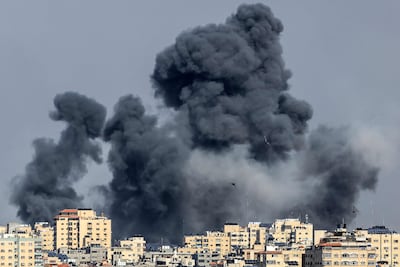Live updates: Follow the latest on Israel-Gaza
A year after the October 7 Hamas attack on Israel, Iran and the region are facing increasing destruction of civilian infrastructure not only in Gaza, Lebanon, Yemen and Syria, but potentially in Iraq and Iran itself.
While the world was shocked by the bloodshed in Gaza where nearly 42,000 people have been killed in Israeli bombing following Hamas’s attack on Israel that killed about 1,200 people, there is growing risk to regional ports, oil installations and motorways.
Lebanon, Yemen, Syria and potentially, Iraq, are all at varying rates of economic fragility and can ill afford to lose critical infrastructure worth hundreds of millions of dollars.
Yet in Yemen’s Hodeidah port in July and late September, that is exactly what happened, as retaliatory Israeli air strikes caused at least $100 million of damage in one of the world’s poorest countries, according to a western diplomat speaking to The National.
For many observers, October 7 was the start of increasing co-ordination between Iran’s regional network of militias, Hezbollah in Lebanon, the Houthis in Yemen, the Iraqi-government-linked Popular Mobilisation Forces (PMF), Palestinian Islamic Jihad and Hamas.
The alliance, largely nurtured under the leadership of slain Iranian Maj Gen Qassem Suleimani, who headed the Islamic Revolutionary Guard Corps’ Quds Force, was already decades in the making. But it has grown into a network of launching points for Iran-supplied ballistic missiles, cruise missiles and drones, arrayed over many thousands of kilometres, that can target Israel and choke off the Red Sea, the transit point for 30 per cent of the world’s shipping container trade.
On paper, this is an achievement for Iran, long opposed to Israel since the 1979 revolution under which the current theocracy rose. It has enacted legislation calling for the abolishment of Israel.
An increasing number of attacks on Israel from what has been called a regional “ring of fire” has surprised observers, presenting a quandary for Israel which has to defend against threats from several directions and altitudes, from high-flying ballistic missiles to drones and cruise missiles that creep under radar beams.
Enabling Peace in Iraq Centre
Infrastructure control is a key aim of this alliance. While highly ideological in nature, rooted in the aspirations of Iran’s theocracy, it involves building networks of armed groups to secure or pressure key trade routes, such as the Red Sea and overland passages through Iraq and Syria, to ensure a safe supply of weapons and resources to allies Hezbollah in Lebanon and the Syrian government.
Iranian aircraft, ostensibly civilian carriers such as Mahan Air, aided this effort, landing arms in Damascus and Aleppo in Syria, and Sanaa in Yemen. Iran-backed groups have taken key positions in Iraqi civil aviation roles, even pressuring the Iraqi government to purchase Russian air defences, which analysts say may be an effort to secure Iraqi skies from Israeli strikes, although the systems were never bought.
Israeli strikes in Iraq so far have been limited, in some cases little more than rumours in remote border regions near Syria. But a US air strike on an unfinished airport near Karbala in early 2020 – attempting to hit the PMF – and Saudi strikes on Houthi-controlled Sanaa airport during Yemen's civil war could indicate where things are headed.
This is a risk in Iraq if the PMF expands control of Baghdad airport, where this correspondent previously visited a PMF compound.

Militias took over other key infrastructure, including ports in Syria, parts of major ports in Iraq and some oil infrastructure, key motorways and even entire towns, such as Jurf Al Sakhar in Iraq, which was emptied of civilians by the Iraqi PMF in 2014 during the war on ISIS.
From the port of Latakia in Syria on the Mediterranean coast, to Aleppo and Damascus airports, to Hodeidah port and Sanaa airport in Yemen, and infrastructure in several of Iraq’s key ports, including Umm Qasr, militias have gained a foothold. In Lebanon, Hezbollah has periodically controlled key infrastructure including telecoms.
Using resources from companies under their control, taxation from checkpoints and smuggling everything from oil to drugs – in the case of Hezbollah – the so-called axis of resistance has bolstered military infrastructure.
PMF militias, under the umbrella of the Islamic Resistance, have fired cruise missiles at Israel – a weapon once the preserve of national armies. Houthis have launched drone and ballistic missile attacks over distances exceeding 2,000km, including one weapon thought to have been intercepted by Israel in space. Hezbollah, too, has fired at least 10,000 rockets. All these weapons require a logistics pipeline that necessitates ports of entry.
No paperwork needed
In 2009, a US court heard how a Hezbollah arms dealer told an undercover FBI agent that Latakia was partly controlled by Hezbollah and “no paperwork” would be needed when bringing in covert shipments of heavy weapons intended for Hezbollah.
In 2021, Israel heavily bombed suspected weapons shipments at the port, setting stacks of containers ablaze at the major storage hub for grain. The port is vital for the country’s meagre exports and imports after more than a decade of ruinous conflict.
A year later, in the summer of 2022, the runways at Damascus International Airport were cratered by Israeli strikes after suspected Iranian arms landed in ostensibly civilian cargo planes. More strikes followed in September that year.

These attacks are now a trend. Damascus and Aleppo airports were hit twice in little more than a month after October 7. The Hamas attack galvanised Israel into loosening rules of engagement, unleashing an unprecedented, devastating barrage of air power over Gaza, Syria and Lebanon.
“We are seeing the normalisation of the destruction of civilian infrastructure,” says Kawa Hassan, a non-resident fellow at the Stimpson Centre who has worked on multiple regional diplomacy projects. "This is the moment of truth for the Islamic Republic of Iran, when it comes to its recent project, Israel is determined to destroy it, they are determined to cut military financial flows from Syria to Iran."
Mr Hassan stresses that while Iran must accept consequences for its actions, the international community has also failed to rein in Israeli destruction, an oversight on the part of Washington and its European allies who “hide behind the US”.
Israeli Prime Minister Benjamin Netanyahu has, he says, presided over the “collapse of rules-based international order, which spells disaster for everyone, including Israelis themselves”.
“At this moment, Israel has no interest in pursuing a peace deal, particularly as it views its strategy in Beirut as successful, and [US President Joe] Biden will do nothing to stop it,” says Veena Ali Khan, a researcher at International Crisis Group. "For Tel Aviv, Iran and its allies are weak right now, hence, it is the ideal time to escalate.
“From Iran and its allies' vantage point, Israel believes that the US will support Israel’s actions regardless of the damage caused to the region. Without a swift diplomatic solution, which seems highly unlikely at present, the conflict is almost certain to spiral out of control.”

Time and again since Hamas’ surprise attack on Israel, Israeli forces have shocked Tehran, killing two IRGC generals in Damascus on April 1, bombing oil storage in Hodeidah on July 20, assassinating then-Hamas leader Ismail Haniyeh in Tehran on July 31, killing scores of Hezbollah fighters with rigged pagers and radios on September 17 and killing then-Hezbollah leader Hassan Nasrallah on September 27.
“Israel will go on regardless, because first it conducted the strike on the Iranian embassy in Damascus,” says Tamer Badawi, an independent consultant focused on the Middle East. "Then it went on to assassinate Haniyeh in Tehran. Iran thinks Israel will continue regardless of whether the militias are attacking or not, because now Israel is capitalising on the escalation to claim more successes while everyone is terrified of worsening violence. So I think as long as Israelis will signal that they're undeterred, then there's no incentive for the Iranians to be restrained."
Mr Badawi agrees that Iran hasn’t launched an open-ended missile campaign yet, as Saddam Hussein did in 1991, firing Scud missiles almost every day in First Gulf War.
“It’s also possible the Iranians are trying to be restrained in the meantime, hoping that a coalition of international actors intervene at this point and say ‘stop, we're going to offer you something in return for this de-escalation'. But otherwise, now Iran feels like its credibility is going with the wind.”
The upshot is that Iran’s “ring of fire” around Israel could become exactly that – a ring of burning civilian infrastructure.
It follows a pattern where Israeli forces struck Beirut International Airport and energy infrastructure in Lebanon during the 2006 war, as well as roads, causing billions of dollars of damage. Even before then, Israel stunned observers with Operation Wooden Leg, the 1985 bombing of the Palestinian Liberation Organisation headquarters near Tunis, which killed up to 70 people, 2,400km from Israel.
Israel may soon find no shortage of civilian targets far and wide if it believes they are used by opponents.
According to Michael Knights at the Washington Institute for Near East Policy, Iran’s allies in Iraq have “asset-stripped the country like the Soviet Union”, placing political allies in key spheres such as energy and finance, controlling banks – many of which are now sanctioned by the US.
They have provided official cover for oil smuggling, jeopardising the country’s key economic sector like “a knife at Iraq’s jugular”, and defrauded financial institutions to the tune of billions, sending much of the funds to Iran, which desperately needs access to dollars. “Oil smuggling from Iraq has become the least subtle part of Iran’s operations,” Mr Knights says.
When it comes to Iran’s militias, “Iran contributes to the cause of their operations financially, but its proxies are expected to contribute back. It notices when some groups are light on paying back. Badr Organisation, Kataib Sayyid Al Shuhada know this and are good at it, Asaib Ahl Al Haq less so,” he says, referring to Iraq’s fragmented landscape of Iran-backed militias.
But Iran’s activities in the energy and port sectors that should be most concerning for Iraq, experts say.
“An Israeli strike on Umm Qasr and Al Basra would have grave economic ramifications for Iraq and for Iran, because Iraq is the financial centre of interest for Tehran,” Mr Badawi says.
For this reason, he says Iran might have more cause to de-escalate, depending on how Israel retaliates for Tuesday’s missile attack. But for Iran itself, there are growing fears Israel could target energy, as it did in Hodeidah.
In July, a western diplomat told The National of his astonishment that Israel had destroyed “about $100 million worth of fuel” in Hodeidah, turning the sky black and orange as storage tanks blazed for days. The provocation, in addition to a drone attack that killed a civilian in Tel Aviv, included a ballistic missile that was, he said, “basically empty” and for propaganda purposes.
Iraq in the firing line
“The risk for Iraq is considerable,” says Omar Al Nidawi, an analyst with the Enabling Peace in Iraq Centre. "The brutal war in Gaza and Lebanon have caused enormous losses among Iran’s allies closest to Israel’s border. We can expect to see Iran try to move more weapons and capabilities into Iraq to compensate for setbacks in Lebanon and Gaza.
“The increasing involvement of Iraqi militias in this conflict will likely invite fresh Israeli air strikes against Iran’s proxies in Iraq. Iraqis will die as a result, and there will be destruction. But these groups do not seem to care.
"Their relationship to Iraq, despite the resistance rhetoric they use, is not that of guardians or stewards of the land, but of parasites to a host, and it didn’t matter if that host were to lose an eye or a leg. They have been conducting their violent pursuit of power and wealth with disregard for public safety, civilian casualties, or the infrastructure of the country.”
As an example, Mr Al Nidawi cites the militias’ wilful violence around Baghdad airport, which has in the past damaged planes, in attempts to target US-backed Iraqi forces there. “They routinely fire rockets at Baghdad’s own airport and other parts of the capital, and have repeatedly fired rockets at oil and gas infrastructure to punish or coerce political rivals. If Israel bombs something, the government would pay to rebuild it, not them, and they can make a profit from corruption in the rebuilding contracts.”

